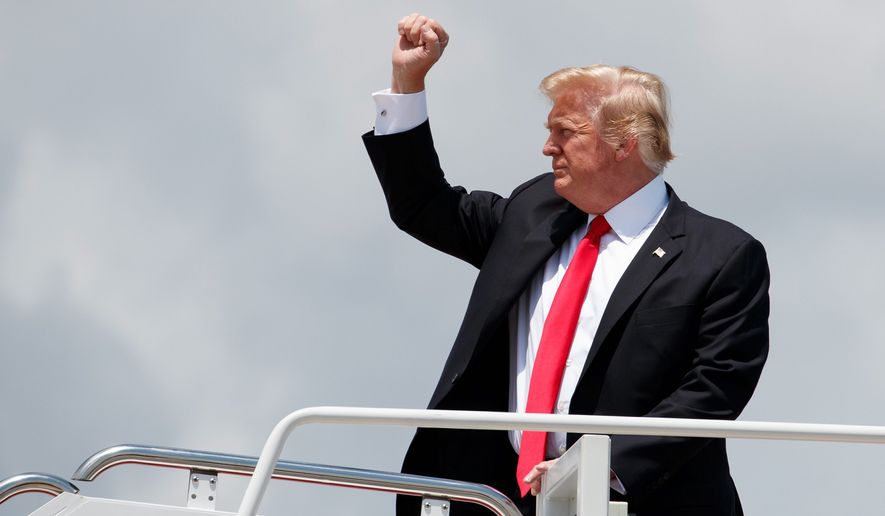President Trump is confident that he is in the catbird seat as he heads overseas Tuesday for a series of potentially pivotal talks with European leaders, all of whom want to get something from him.
NATO wants reassurances of America’s commitment to Europe’s military defense, the United Kingdom wants stronger ties with the U.S. amid Brexit turmoil and Russia wants relief from U.S. sanctions.
White House officials described Mr. Trump’s outlook as his trademark confidence as he sets out for a NATO summit in Brussels, followed by a two-day visit to Britain and finally a summit with Russian President Vladimir Putin in Helsinki.
The president sent signals Monday that he was feeling emboldened, maybe more so than when he shook up NATO allies last year with public demands that they pay their share for the military alliance.
This time, his stature on the world stage is bolstered by his unprecedented summit with North Korean leader Kim Jong-un.
He also has a strong economy behind him and relatively stable politics at home. His European counterparts fear economic downturn, and several face political meltdowns at home. British Prime Minister Theresa May’s government is fractured by Brexit, and German Chancellor Angela Merkel is struggling to hold her coalition government together amid the immigration crisis.
The unsettled landscape is not necessarily advantageous to Mr. Trump.
“The president is going into a situation where most of the countries he will be talking to will not be thinking internationally because they have so many headaches domestically,” said Christopher Swift, a national security scholar at Georgetown University.
He blamed Mr. Trump’s policies and rhetoric for creating the atmosphere of uncertainty.
“Even if on an individual basis each of these countries might want something from him, our allies in Europe are also very concerned about him, some of the decisions that have been made,” Mr. Swift said.
Mr. Putin also will arrive in Helsinki in a position of strength as his government has a stranglehold on Russia’s politics and economy.
Topping Mr. Putin’s agenda for the summit is the relaxation of U.S. sanctions on his country. But he is likely to resist Mr. Trump’s requests to curb Russia’s involvement in the wars in Syria and Ukraine.
At the NATO summit in Brussels, Mr. Trump will keep pressing the cost-sharing issue.
“The United States is spending far more on NATO than any other Country. This is not fair, nor is it acceptable,” tweeted Mr. Trump.
He singled out Germany, the second-wealthiest NATO member after the U.S., for paying less than the minimum 2 percent of gross domestic product that the alliance agreed its members should spend.
Of the 29 NATO member countries, only five others pay the required 2 percent of GDP: the U.K., Greece, Estonia, Romania and Poland.
“By some accounts, the U.S. is paying for 90% of NATO, with many countries nowhere close to their 2% commitment,” tweeted Mr. Trump. “On top of this the European Union has a Trade Surplus with big Trade Barriers on U.S. goods. NO!”
Mr. Trump was more forgiving about the political upheaval in the United Kingdom.
Mrs. May’s government was rocked Monday by the abrupt resignation of Foreign Secretary Boris Johnson, deepening the crisis over Brexit and putting Mrs. May’s leadership in jeopardy.
“The President continues to look forward to his working visit with the Prime Minister on July 13, and further strengthening the U.S.-U.K. special relationship,” said White House press secretary Sarah Huckabee Sanders.
Mr. Trump is set for a two-day whirlwind British visit that starts Thursday and includes talks with Mrs. May and an audience with Queen Elizabeth II.
A U.S.-U.K. trade deal expected to be discussed during Mr. Trump’s visit could provide Mrs. May with a respite from the Brexit turmoil.
• S.A. Miller can be reached at smiller@washingtontimes.com.




Please read our comment policy before commenting.